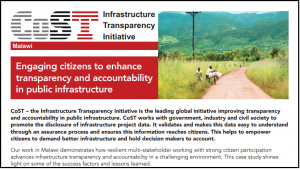Our achievements include saving millions in public money and driving social inclusion to improve the lives of thousands of people stem from the unique nature of our approach and the four core features of disclosure, assurance, multi-stakeholder working and social accountability.
Presidential support drives infrastructure transparency, participation and accountability in Malawi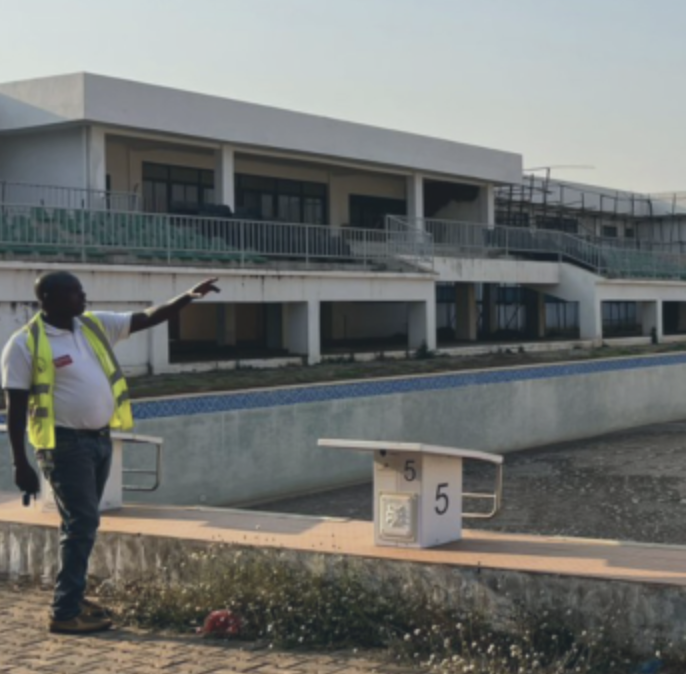
Our impact story highlights how CoST member, Malawi, has strengthened infrastructure transparency, participation and accountability in the country even further since their previous success, including working with the President of Malawi.
Navigating Guatemala’s political climate to improve infrastructure transparency 
CoST Guatemala’s infrastructure transparency story shows vital changes they’ve helped create in infrastructure transparency, accountability and participation since their membership in 2010, despite difficult political circumstances.
CoST Guatemala’s work has led to transparency reforms through new laws and mandates requiring the publication of infrastructure data, including in line with the CoST Infrastructure Data Standard.
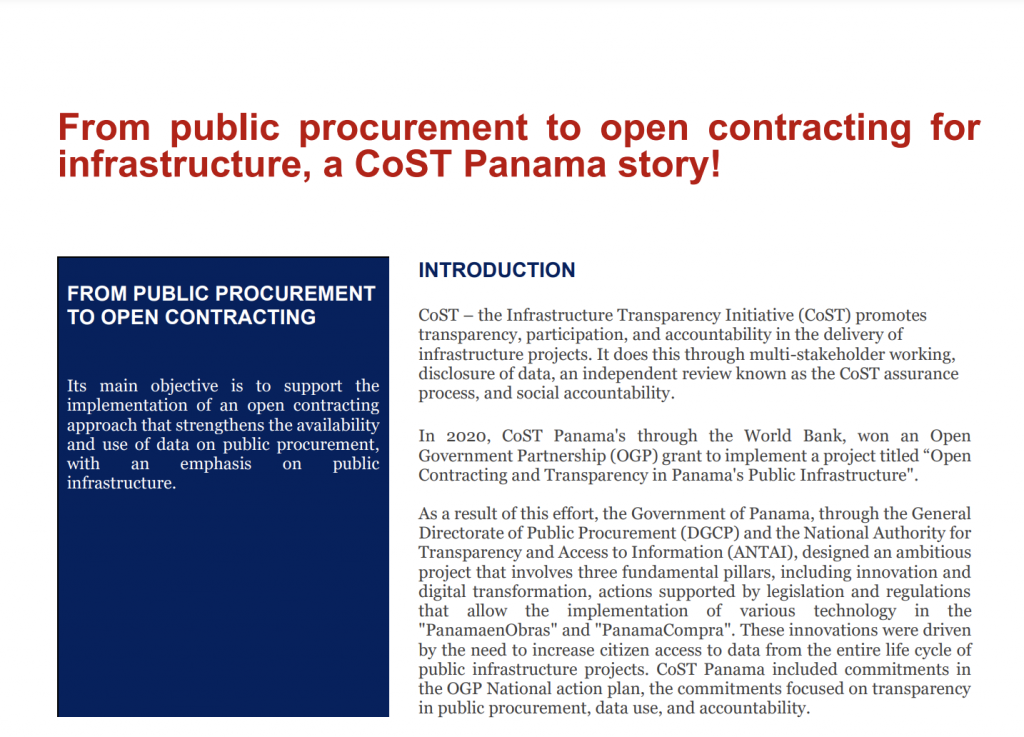 From public procurement to open contracting for infrastructure, A CoST Panama Story
From public procurement to open contracting for infrastructure, A CoST Panama Story
CoST Panama’s story highlights how they’ve enhanced infrastructure transparency through the creation of “PanamaenObras” data portal, working with the Open Government Partnership and civic engagement.
Improving social and economic inclusion in Sekondi-Takoradi, Ghana
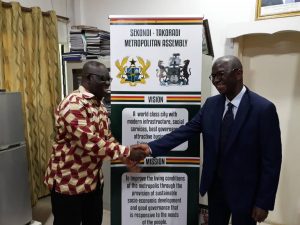
Our infrastructure accountability story on improving social and economic inclusion highlights how CoST Sekondi-Takoradi has improved transparency by publishing infrastructure data on a shared information platform; published independent reviews of this data and engaged with disability rights campaigners and the media, to help improve social and economic inclusion in the Western Region of Ghana.
Increasing transparency to improve market competition and infrastructure governance in Ukraine
This case study on market transparency in CoST Ukraine highlightstheir work from 2016, including developing systems to publish and analyse data in an open, accessible way, while also reducing corruption and improvingmanagement and governance practices in the road sector with locally led solutions.
Achieving infrastructure transparency in cities and regions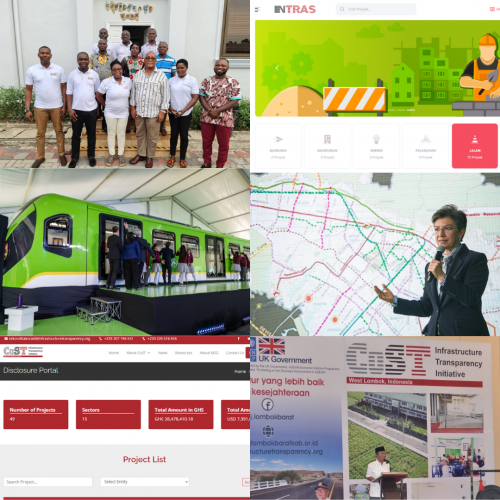
This case study focuses on the work of sub-national members in enhancing institutional multi-stakeholder forums, delivering open government commitments, enabling transparency in megaprojects and programmes and using data to improve projects. It details the work of cities of Sekondi-Takoradi in Ghana and Bogota in Colombia, the region of Jalisco in Mexico and the Regency of West Lombok in Indonesia.
How CoST supports donor objectives: A case study of our partnership with the Government of the Netherlands 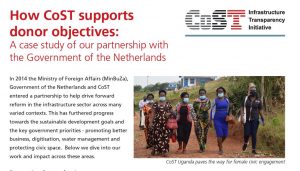
In this case study on supporting donor objectives, we dive into our work and impact towards the sustainable development goals and the key government priorities – promoting better business, digitisation, water management and protecting civic space.
Civic engagement strengthens supply of water, income and food for Ugandan farmers
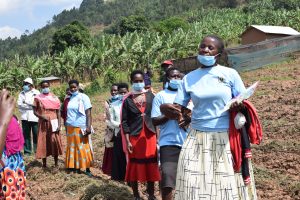 CoST Uganda has helped to address lack of civic engagement, leading to inefficiency in crops and livestock infrastructure through community events, where local residents have brought their concerns to decision-makers. Our impact story on Ugandan farmers highlights how this has led to better maintained projects and an agreement from the government to extend water supply to 200 new farmers.
CoST Uganda has helped to address lack of civic engagement, leading to inefficiency in crops and livestock infrastructure through community events, where local residents have brought their concerns to decision-makers. Our impact story on Ugandan farmers highlights how this has led to better maintained projects and an agreement from the government to extend water supply to 200 new farmers.
Levelling the playing field: How CoST Uganda promotes business integrity
CoST Uganda launched the programme Promoting fair business practices in Uganda. Levelling the playing field explores how Uganda’s business environment increased transparency, competition and local content provisions through CoST.
The need for CoST: Strengthening economies and improving lives
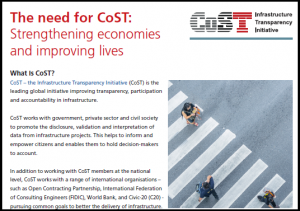
Applying our approach to infrastructure transparency results in cost savings of magnitude, helping to deliver better-quality and more efficient infrastructure for millions. Our factsheet on the Need for CoST explores the myriad ways the CoST approach has been felt at localand national levels.
Also available as La Pertinence de CoST (French), La necesidad de CoST (Spanish) and A necessidade da iniciativa CoST (Portuguese).
CoST Thailand: Saving millions, enabling participation and shifting mindsets
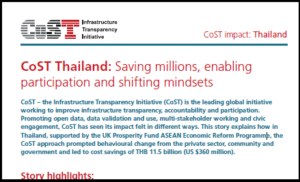
In Thailand, the CoST approach led to cost savings of THB 11.5 billion (US $360 million). CoST Thailand’s impact story on saving millions shows how the use of the CoST Infrastructure Data Standard has led to competitive bidding, lower contract prices, a more efficient use of public budget, and raised the voice of localcommunities during project delivery, resulting in improved project quality.
CoST approach saves millions: Paving the way to a strong economy in Afghanistan
CoST Afghanistan’s First Assurance Report in 2018 identified major problems in the project cycle of work on the road network, with significant time and cost overruns. Our case study on Afghanistan highlights that as a result of CoST Afghanistan, the National Road Authority created an independent, pre-contract oversight body, leading to savings of US$8.3 million between 2018–2019 alone.
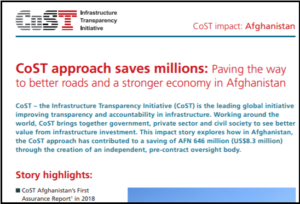
Transforming lives and infrastructure in Wakiso District,
Uganda
Wakiso District is a rapidly expanding urban area outside Uganda’s bustling capital city, Kampala. Wakiso District has sufferedfrom issues such as poor sanitation and overcrowding. The four features of the CoST approach – disclosure, assurance, multi-stakeholder working and social accountability – have helped to transform infrastructure delivery in Wakiso District.
Overhauling the Honduras Road Fund
Procuring entities in Honduras disclosed infrastructure data via online platform SISOCS, including the Road Fund (Fondo Vial), the public body responsible formaintaining Honduras’s road network. The gaps in disclosed data from the Road Fund were around 40%. This impact story on the Road Fund shows how CoST Honduras’s work led to the Road Fund being dismantled, and replaced by a new, transparent Directorate of Road Heritage Conservation.
The CoST Malawi impact story shows how multi-stakeholder enhances the fight for transparency and accountability in public infrastructure. CoST Malawi has published assurance projects on over 90 projects in vital areas such as roads, energy, water, health, education and housing and improved legal frameworks and media and citizen engagement.
CoST Honduras: A win for transparency and engagement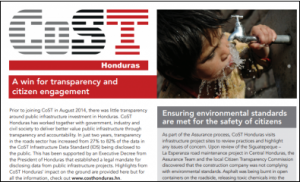
A win for transparency and engagement outlines CoST Honduras’s achievements through multi-stakeholder working with government, industry and civil society to advance transparency and accountability in public infrastructure. Between 2014 and 2016, disclosure rose from 27% to 82%. Citizens have also become empowered to hold decision makers to account with public infrastructure projects.
CoST Ukraine: Strengthening transparency in a challenging context
This CoST Ukraine case study on transparency explores the factors which contributed to the strength of the CoST Ukraine programme in the face of political upheaval in 2013. The previous lessons from Ukraine are especially relevant for the implementation of transparency and accountability initiatives in countries affected by political instability, poor governance and a lack of public trust.
CoST Uganda: Delivering better value public infrastructure
This case study on CoST Uganda and public infrastructure highlights that between 2014 and 2017, they saved millions of public money. CoST Uganda has used data disclosure to increase transparency, assurance processes to increase accountability and multi-stakeholder working to drive efficiency.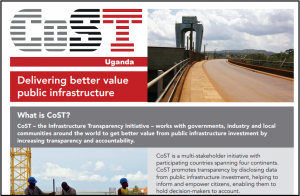
CoST success stories from around the world
This case study on a range of CoST programmes including Ethiopia, Guatemala and Honduras explores achievements such as reduction on construction times; increasing the income of local farmers and saving millions of public money.
Also available as Mejor valor para las infraestructuras públicas (Spanish) and Meilleure rentabilité des fonds investis dans les infrastructures publiques (French).
CoST Factsheet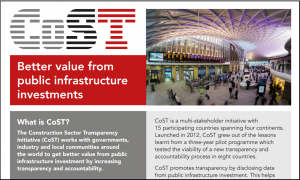
This CoST Factsheet introduces our work, explaining the need to spearhead change in the delivery of public infrastructure by strengthening transparency and accountability. It provides an overview of how CoST works, our governance structure and our core features of publication of data (disclosure), independent review of data (assurance), multi-stakeholder working and social accountability.
Also available in Mejor valor para las inversiones en infraestructura pública (Spanish) and Meilleure rentabilité des fonds investis dans les infrastructures publiques (French).
